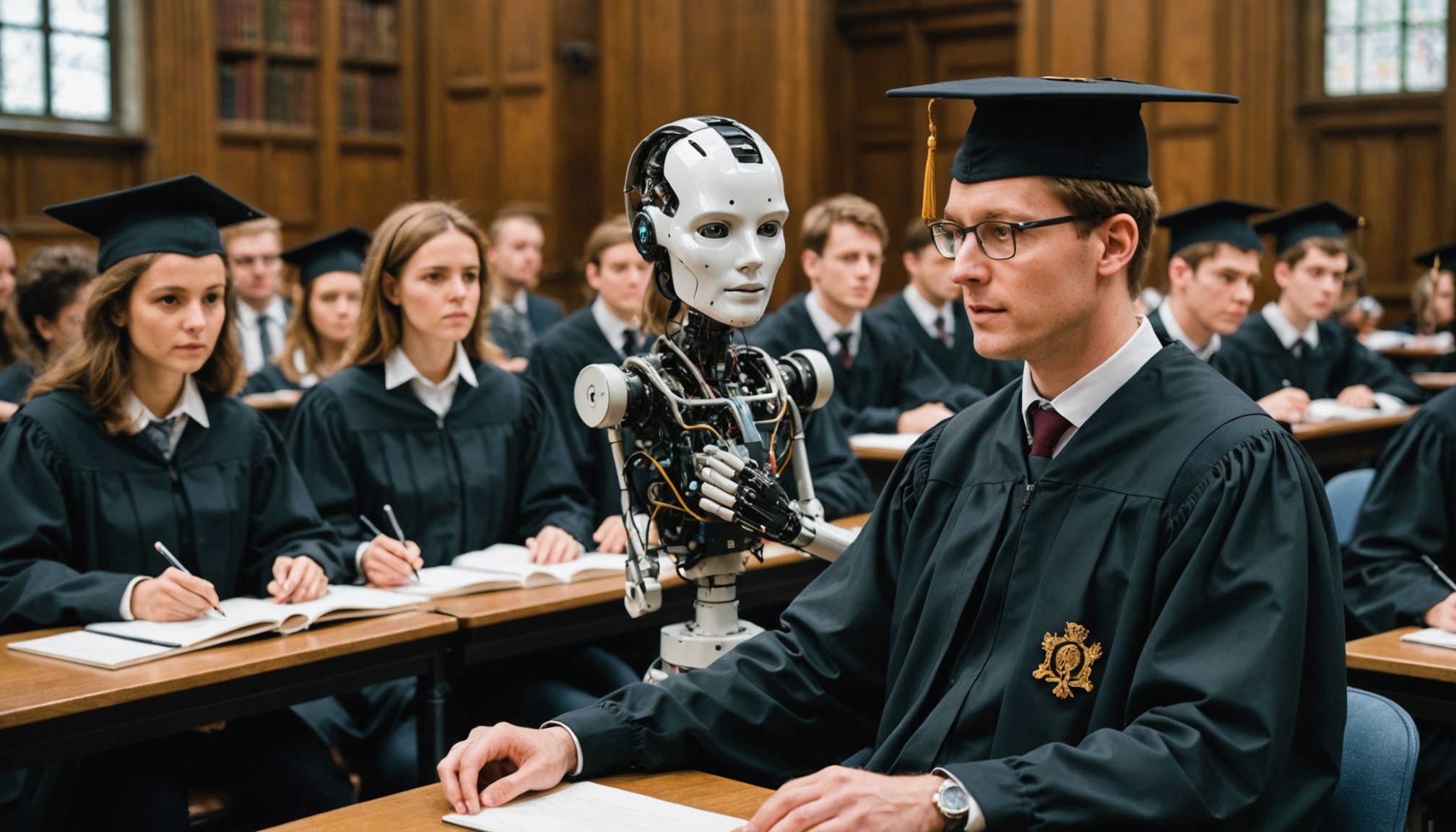Overview of AI in Higher Education
Artificial intelligence (AI) is reshaping education by employing innovative technologies to enhance academic performance. The role of AI in universities is growing as institutions integrate tools that assist in personalising learning experiences, automating administrative tasks, and facilitating research. AI in higher education enables professors and students to achieve more effective outcomes by tailoring content to individual needs.
In the UK, universities have adopted various AI technologies. These include automated grading systems, chatbots for student inquiries, and predictive analytics to improve student retention rates. Such tools enhance the learning environment by promoting efficiency and providing students with relevant, timely feedback.
In the same genre : Harnessing the power of ai in predictive analytics to transform the uk logistics industry
AI aligns with the academic goals of universities by supporting research and encouraging critical thinking. By analysing large datasets, AI helps uncover valuable insights, fostering a data-driven approach to problem-solving. The importance of AI in educational contexts cannot be overstated; it not only aids in managing academic workloads but also supports faculty in delivering top-quality education. Embracing AI technologies is crucial for universities striving for excellence. By enhancing the overall educational experience, AI contributes to a thriving, innovative academic culture that empowers both educators and students to excel.
AI Technologies Enhancing Academic Performance
Emerging AI technologies are revolutionizing education, promising improved academic performance and personalized learning experiences.
Also to see : Revolutionizing drug discovery: how quantum computing is shaping the future of medicine in the uk
Machine Learning and Personalized Learning
Machine learning plays a crucial role in creating personalized learning environments. Through intelligent algorithms, AI tailors educational content to suit individual student needs, enhancing engagement and comprehension. Case studies highlight schools successfully implementing machine learning to improve student outcomes, showcasing increased retention and comprehension rates. The potential for adaptive learning systems is immense, offering tailored educational experiences that react in real-time to a student’s progress.
Data Analytics for Academic Success
Data analytics serves as a powerful tool in tracking and enhancing academic performance. By analyzing student data, AI can pinpoint at-risk students and suggest effective intervention strategies. Institutions are increasingly leveraging data analytics to foster environments that boost academic success and retention. Examples include colleges using analytics to personalize tutoring services and monitor progress, demonstrating significant improvements in student performance.
Automated Assessment Tools
Automated assessment tools streamline the often burdensome grading process while aiming for unbiased evaluations. These tools facilitate quick feedback mechanisms, allowing educators to focus more on teaching and less on administrative tasks. However, the use of AI in assessments presents challenges, such as maintaining the quality of feedback and adapting to diverse subject matter nuances.
Real-World Examples and Case Studies
Universities across the UK are beginning to lead AI case studies by showcasing successful AI implementations. These institutions have become breeding grounds for innovative experiments in education.
Take, for instance, the University of Leeds, which integrates AI into their student support system. Such systems analyze student data, providing personalized learning resources and tutorials, thereby enhancing student achievement.
Additionally, the University of Oxford has implemented AI to optimise course delivery and streamline administrative tasks. Their AI program has substantially reduced administrative workload, freeing up resources for direct educational support.
University AI programs like these have substantial impacts. For example, student performance metrics improved markedly after AI-enabled customized study plans were introduced. This program led to a 20% increase in student satisfaction rates regarding coursework and support.
Lessons learned from these implementations highlight the importance of iterative development. Institutions report that initial AI models often need adjustments to better align with educational goals. Flexibility in programming and a feedback loop involving students and faculty are crucial.
These examples underscore the transformative potential of AI in the academic realm, illustrating both technological prowess and commitment to enhancement of educational systems.
Benefits and Challenges of AI in Education
The integration of AI in education presents a multitude of opportunities and challenges. Understanding these aspects can provide valuable insights into harnessing AI’s potential in educational settings.
Benefits of AI for Academic Excellence
AI technologies can significantly enhance learning experiences by offering personalized learning paths, thereby increasing engagement among students. By analysing data, AI tailors educational content to fit individual learning paces, improving overall learning outcomes. Moreover, administrative tasks benefit from automated processes, allowing better resource allocation and operational efficiency. This not only reduces workload but ensures that valuable human resources focus on more strategic initiatives. AI also plays a crucial role in increasing accessibility and inclusivity, making education more reachable to those with disabilities or learning challenges through adaptive technologies.
Challenges Facing AI Implementation
Despite these benefits, there are significant barriers. Technical and financial constraints can impede the adoption of AI solutions across universities. Furthermore, resistance arises from faculty or stakeholders wary of AI’s transformative nature. Ethical concerns, particularly about data privacy and AI biases, remain prevalent as AI systems can unintentionally perpetuate existing prejudices. Addressing these issues requires a comprehensive strategy involving training and clear policy guidelines.
Future Trends in AI and Education
Universities anticipate continuous AI evolution. Innovations like AI-driven teaching assistants and virtual reality classrooms aim to further academic excellence. While expert insights forecast sustained advancements, institutions must remain vigilant about responsibly managing AI’s integration into education.
Expert Opinions and Insights
Delving into expert views on AI in education unveils a myriad of perspectives on how artificial intelligence is reshaping academia. Leading figures in educational technology insights highlight the transformative potential of AI in creating adaptive learning environments. These academic authorities on AI suggest that AI can personalize education, tailoring learning paths to individual student needs, thereby enhancing educational outcomes.
Experts foresee a future where AI’s role in academia will expand, supporting both instructors and students. Academic authorities predict that AI will not only automate administrative tasks but also provide innovative learning experiences. They emphasize the importance of fostering human-AI collaboration, ensuring that technology complements rather than replaces educational interactions.
To effectively embrace AI technologies, universities are recommended to develop strategies that incorporate both technological advancements and human oversight. Establishing interdisciplinary teams to guide AI integration is vital. Furthermore, investing in faculty development programs ensures educators are equipped with the necessary skills to leverage AI. As AI continues to evolve, these insights and recommendations provide a roadmap for universities to navigate the integration of these advanced technologies into their academic frameworks.






